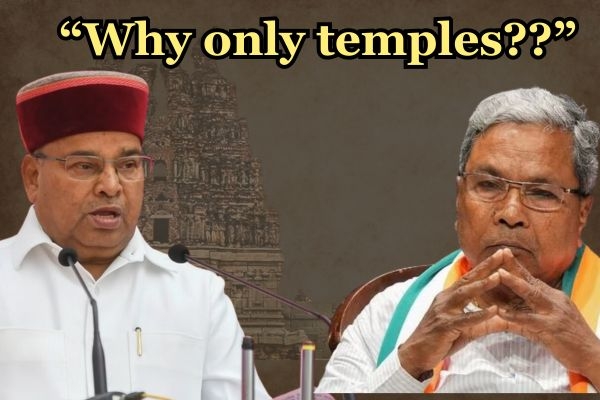‘Why not other religious bodies?’ ; Karnataka Governor refuses to sign temple tax bill
Total Views |
Bengaluru: In a big setback for the Karnataka government, Karnataka Governor Thawar Chand Gehlot has refused to sign the Temple Tax bill Bill, questioning as to why only Hindu temples are being taxed. Emphasising that it is discriminatory to only a particular religion, he noted that all religious bodies should be taxed under the bill.

In an embarrassment over the Religious Endowment Bill, Governor Thawar Chand Gehlot withdrew the Karnataka Hindu Religious Institutions and Charities Bill.
The governor questioned whether other religious organisations will be included in this bill. The governor further questioned whether the state government has any concept of making any act on the model of this bill by including the amendment brought in relation to Hindu religious institutions.
Big blow to Tipu sena govt of Karnataka, Governor Thawar Chand Gehlot ji refused to sign the temple tax bill.
— Mr Sinha (Modi's family) (@MrSinha_) March 21, 2024
He commented "why not tax other religious bodies as well, why only temples"?? pic.twitter.com/eYQ2loxR4p
Refusal of the Governor to sign the amendment bill mandates that the 'general collection fund' accumulated in the rich temples under the jurisdiction of the Mujarai department be used for non-revenue 'C' category temples.
About the Bill
The bill mandated a 10 per cent tax on cash-rich Hindu temples. The proposal was a part of the state government's 'Karnataka Hindu Religious Institutions and Charitable Endowments Bill 2024', mandating the state government to charge 10 per cent tax from temples generating revenue exceeding Rs 1 crore and 5 per cent from shrines with revenue of between Rs 10 lakh and Rs 1 crore. The bill also sought the creation of state-level and district- level committees to "scrutinize, review and submit" proposals on infrastructure development for pilgrims.
In Simple Words : According to this bill, if the revenue of a Hindu temple is 1 crore rupees, then the government can take a 10 per cent tax from the temple, and if the temple’s revenue is less than 1 crore but more than Rs 10 lakh, then the government can take 5 per cent tax from the temple.
The bill sparked a huge controversy in Karnataka, with the opposition BJP alleging that the Siddaramaiah dispensation is indulged in rolling out "anti- Hindu" policies.
The demand to remove Hindu temples from government control has grown over the years, and this decision can be seen as a success for that movement in at least one crucial state.
Notably, the Muzrai (Endowment) department oversees 34,563 temples in the state, which have been classified as grades A, B, or C based on their revenue generation. A total of 207 temples with yearly revenue exceeding Rs 25 lakh fall into category A, 139 temples with annual revenue between Rs 5 lakh and Rs 25 lakh fall into category B, and 34,217 temples with annual revenue less than Rs 5 lakh go into category C.
The government contended that once the bill is enacted into law, it would allow for the redistribution of revenues from temples with higher earnings to those with lower earnings. Kot Srinivas Poojari, LoP in the council, said, “It is a blatant exhibition of an anti-Hindu stand by Congress. It wants to take away money from temples, while it is generous enough to allocate lavishly to Waqf Board.”
As outlined in Section 19(a), the funds collected in the CPF can be utilised for the benefit of the "poor and needy organisations", which is not a clear definition of what exactly it constitutes. Critics argue that this vague terminology opens the door to potential misuse of temple funds, diverting them away from their intended religious and community purposes.
Another controversial provision, detailed in Section 25, allows for the appointment of members from both Hindu and other religious communities to the management committee of composite institutions. This move has been labelled as an infringement on the autonomy and traditional management structures of Hindu temples.

